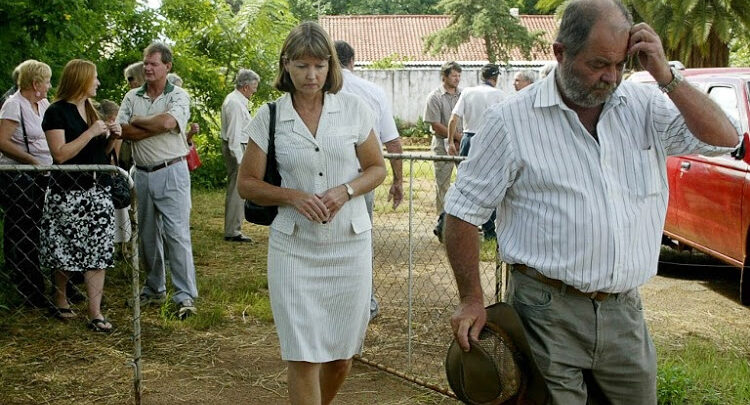‘Ghosts’ emerging on the list of white farmers to be compensated

Some of the former white farmers in Zimbabwe
HARARE — Compensation of white former commercial farmers has been mired in controversy before it has even been implemented, amid allegations a fake farmers’ list has been formed so the politically-connected and well-heeled can loot from the scheme.
On Monday, South Africa-based commentator, Rutendo Matinyarare tweeted: “Did you know that ghost white farmers have been created and are awaiting payment as our leaders prepare to loot the white farmer compensation debt that they are creating?
“Not sure why I’m telling you coz it’s not like you will do anything about it anyway. I just need to vent,” he said.
Fresh on the minds of Zimbabweans is the Farm Mechanisation Scheme which was looted by politically-connected individuals, some of whom had no farms, and the debt passed on to the taxpayer.
Now, opinion is split among former white farmers, with some distancing themselves from the agreement signed last week between the government and current leadership of the Comnercial Farmers Union and Southern African Commercial Farmers’ Alliance-Zimbabwe.
The dissenting farmers argue the US$3,5 billion compensation deal was signed under duress and President Emmerson Mnangagwa was trying to circumvent the 2008 Sadc Tribunal judgment.
The tribunal ruled in favour of the farmers who had petitioned the court to issue an order barring the Zimbabwean government from taking over their farms without compensation.
The judges held that the farmers, who were facing eviction, could keep their farms because the land reform “undermined the rule of law”.
The panel also ruled that “fair compensation” should be given, “on or before June 30, 2009,” to farmers who had already been evicted from their farms before the judgment was handed down.
Glyn Hunter of Mike Campbell Foundation, which was formed after farmer Mike Campbell lost his farm, said the agreement had generated significant debate among the beleaguered former commercial farmers, who lost everything during the violent farm takeovers.
In a statement, Hunter said Mnangagwa’s government placed signatories and the Valuation Consortium under considerable pressure. “The signing has been a very contentious issue that has generated significant debate on various platforms among dispossessed commercial farmers who lost everything during the violent farm takeovers, which began 20 years ago and still continue,” Hunter said.
“Mnangagwa’s government placed the farming organisations under considerable pressure to sign the agreement — and within a very short timeframe — stating it was their last chance to receive a compensation offer from the government.”
Campbell’s son-in-law, Ben Freeth, who represented the farmers at the Sadc Tribunal, said a significant number of the former farmers, who were financially hamstrung, elderly and in poor health, were pressured to sign.
“A significant number of dispossessed farmers, many of them in dire straits financially, as well as being elderly and in poor health, signed up, despite only seeing a draft agreement as the final document was withheld,” he said.
“As Sadc Tribunal Rights Watch (SADC-TRW), we wish to distance ourselves from the global compensation agreement that the CFU, SACFA-Z and the Valuation Consortium were under extreme pressure to sign — and within a minimal timeframe.”
Added Freeth: “Although the reasons for the pressure were not clear, numerous legal experts and dispossessed farmers, many of them living in dire straits in Zimbabwe or scattered around the world, urged caution and highlighted legal shortcomings in the proposed draft agreement.”
The farmers said the Zimbabwean government was broke and could not afford to settle the US$3,5 billion deal. “The reality is that the government is broke and although the parties have agreed to a sum of US$3,5 billion, there is no money available or pledged, and the farming organisations are expected to work with the government to raise it internationally,” he said.
At the signing ceremony, Finance minister Mthuli Ncube said: “In the agreement, we have given ourselves 12 months to run around the world, around Zimbabwe to think of ways of raising this funding. We are determined that we will achieve that. It’s also about pledges, not necessarily about cash being put on the table. It’s about commitment.”
The farmers would receive 50 percent of the compensation after a year and the balance within five years. The farmers said Zanu PF acting spokesperson Patrick Chinamasa, who was then Justice minister, had been trying to circumvent the 2008 Sadc Tribunal judgment.
Freeth added: “If individual farmers do sign up to this ‘deal’ over the next nine months — the time line agreed to — those farmers will be locked into a process which strips them of any further claims or rights that are derived from the landmark Sadc Tribunal judgment of November 28, 2008.
“This will be tragic given that everything farmers and their families had worked for and invested in over decades — in some cases for up to four generations — was taken from them.
They lost their entire farming enterprises and livelihoods, including expensive equipment and machinery, crops, livestock and wildlife.”
He said the farmers found themselves in the invidious position of supporting the very tyranny that has left them and the majority of Zimbabweans in financial dire straits.
At the signing ceremony last month, Mnangagwa said the agreement would bring closure to the contentious issue.
“This momentous event is historic. It brings closure and a new beginning,” he said then.
Information secretary Nick Mangwana could not be reached for comment. —– Observer-NewsDay.







